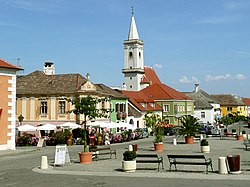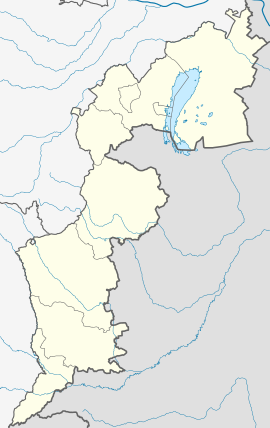|
Rust, Burgenland
Rust (German pronunciation: [ʁʊst] ⓘ; Croatian: Rušta; Hungarian: Ruszt) is a city in the Austrian state of Burgenland, located on the western shore of Lake Neusiedl near the border with Hungary. With only about 1,900 inhabitants, it is the country's smallest statutory city, as it was endowed with the rights of a royal free city by the Hungarian crown in 1681. As a Statutarstadt, it also forms an administrative district (Bezirk) in its own right. The city is famous for its wines, especially for Beerenauslese, ice wine and - especially - Ruster Ausbruch. History The settlement was first mentioned as Ceel in a 1317 deed issued by King Charles I of Hungary, its name derived from Hungarian szil for Elm, later translated into German Rüster or Rusten. The present-day Hungarian name Ruszt is again a translation from the German term. Rust's citizens received market rights in 1470 and the privilege to mark the corks of their wine barrels with the famous 'R' brand in 1524. The affluent town finally gained independence at the 1681 diet at Sopron by the order of Emperor Leopold I, King of Hungary. With the Burgenland region, Rust passed from Hungary to the Republic of Austria in 1921. PoliticsSeats in the municipal assembly (Gemeinderat) as of 2007 elections:
Twin towns Rust is twinned with: References
External linksWikimedia Commons has media related to Rust (Burgenland). |
||||||||||||||||||||||||||||||||||||||||||||||||
Portal di Ensiklopedia Dunia




